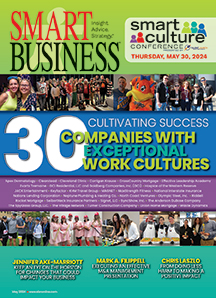Work as a team
Blaushild says that once you have a family that trusts each other, the value you need to concentrate on is communication.To become a better company, you need to have open, honest,respectful communication.
“We’re not always going to agree with each other, but if we communicate and we understand each other and we understand where we’re coming from, we have a great opportunity to become better and to keep improving as a company,” he says.
One way Blaushild improved communications at Famous was by setting up the “lunch, listen and learn” program. As part of this program, the executive management team would travel to differentFamous locations and spend several hours discussing issues with their employees. He wanted to know what was working, what wasn’t working and what the company could be doing better.
Blaushild says the input from the sessions gave Famous plenty of ideas that eventually evolved into significant company changes.
“It wasn’t a management team discussing it in a boardroom and then telling our people this is what we’re going to do,” he says. “It was truly a dialogue with our people, and there were a lot of things we learned from our associates about what we needed to do to become a better company.”
Some examples of ideas that have been developed with help from employee input are an associate orientation program, an online, real-time Web marketplace and the integration of all ofFamous’ product groups into its central distribution center.
Of course, not every idea is a slam dunk. Blaushild goes off-site with his management team to talk strategically and sort through the input they’ve received. The team tries to determine which ideas align best with the company’s priorities and goals. The group doesn’t always reach consensus, and that’s when Blaushild’s fourth value, teamwork, becomes important.
“We value everybody’s input, regardless of what the discussion is about because everybody has knowledge and experiences to bring something to the table,” Blaushild says. “Because we value it, they offer their thoughts. We try to listen and treat each other respectfully. Even if we disagree, the more we talk, the more information we have to make an informed decision.”
Blaushild has several keys to improving teamwork in an organization. One of the biggest obstacles to creating a great team is making sure you have the right people in the right roles. Blaushild says the first step is evaluating the skill sets and attributes of your employees.
“Everybody’s got strengths and everybody’s got talents,” he says. “It’s up to us to identify the great strengths that each person has.”
Once you know what they can do, you need to find out what they want to do. An employee could have a passion for working at the counter and greeting customers, or the employee may be better suited for taking incoming calls or soliciting business.
“We’ve moved around a lot of people.” Blaushild says. “We’ve let people try different things. Some have flourished in those new areas; some decided to come back to the area they were in. They realized they missed it or that they were very good at it.”
However the results turn out, Blaushild says you should be flexible with your people because if you can get them in the roles that are optimal for them, your company will prosper.

